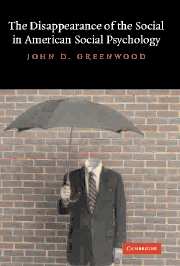Book contents
- Frontmatter
- Contents
- Preface
- Introduction: What Happened to the “Social” in Social Psychology?
- 1 The Lost World
- 2 Wundt and Völkerpsychologie
- 3 Durkheim and Social Facts
- 4 The Social and the Psychological
- 5 Social Psychology and the “Social Mind”
- 6 Individualism and the Social
- 7 Crowds, Publics, and Experimental Social Psychology
- 8 Crossroads
- 9 Crisis
- 10 The Rediscovery of the Social?
- References
- Index
5 - Social Psychology and the “Social Mind”
Published online by Cambridge University Press: 18 December 2009
- Frontmatter
- Contents
- Preface
- Introduction: What Happened to the “Social” in Social Psychology?
- 1 The Lost World
- 2 Wundt and Völkerpsychologie
- 3 Durkheim and Social Facts
- 4 The Social and the Psychological
- 5 Social Psychology and the “Social Mind”
- 6 Individualism and the Social
- 7 Crowds, Publics, and Experimental Social Psychology
- 8 Crossroads
- 9 Crisis
- 10 The Rediscovery of the Social?
- References
- Index
Summary
One reason for the neglect of the social in post-1930 American social psychology appears to have been ultimately misguided but not entirely unjustified fears concerning the illegitimate “reification” or “personification” of social psychological phenomena. Such fears were a reaction to some of the more extreme claims made by social theorists such as Durkheim (1895/1982a), Espinas (1877), Fouillée (1885), Hegel (1807/1910), Hobhouse (1913), Le Bon (1895/1896), Lévi-Bruhl (1923), McDougall (1920), Martin (1920), Schäffle (1875–1878), Sighele (1892), Tarde (1890/1903), Wallis (1925, 1935a), and Wundt (1916, 1900–1920), who sometimes talked of social groups as emergent supraindividuals or organisms. However, in rejecting the (albeit sometimes rather extreme) positions of such theorists tout court, many American social psychologists effectively threw out the baby with the bathwater.
The notion that social groups, or societies themselves (or states or nations), form emergent supraindividuals or organisms has been popular with social theorists since at least the time of Plato and was particularly prominent among idealist social theorists such as Hegel (1807/1910), Green (1900), and Bosanquet (1899). The notion of a social “mind” or “spirit” or “soul,” usually but not invariably associated with a nation or state, became the common intellectual currency of such idealist thinkers and was imported into social scientific disciplines such as history, sociology, and the new German discipline of Völkerpsychologie. Such notions were popularized and applied to smaller social units by European social theorists such as Espinas (1877), Tarde (1890/1903), and Le Bon (1895/1896), who were particularly impressed by (and concerned about) the behavior of crowds and mobs but who also extended the notion of a social or group mind to all forms of social groups (large and small, disorganized and organized, voluntary and involuntary, and so forth).
- Type
- Chapter
- Information
- The Disappearance of the Social in American Social Psychology , pp. 109 - 135Publisher: Cambridge University PressPrint publication year: 2003



